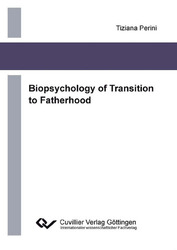| Fachbereiche | |
|---|---|
| Buchreihen (97) |
1381
|
| Nachhaltigkeit |
3
|
| Gesundheitswesen |
1
|
| Geisteswissenschaften |
2369
|
| Medienwissenschaften | 16 |
| Theologie | 57 |
| Philosophie | 102 |
| Rechtswissenschaft | 423 |
| Wirtschaftswissenschaften | 851 |
| Sozialwissenschaften | 417 |
| Sportwissenschaften | 48 |
| Psychologie | 233 |
| Pädagogik | 190 |
| Geschichtswissenschaften | 183 |
| Kunstwissenschaften | 111 |
| Kulturwissenschaften | 166 |
| Literaturwissenschaften | 117 |
| Sprachwissenschaften | 88 |
| Naturwissenschaften |
5408
|
| Ingenieurwissenschaften |
1795
|
| Allgemein |
98
|
|
Leitlinien Unfallchirurgie
5. Auflage bestellen |
|
Erweiterte Suche
Biopsychology of Transition to Fatherhood
Tiziana Perini (Autor)Vorschau
Inhaltsverzeichnis, Datei (36 KB)
Leseprobe, Datei (69 KB)
The focus of this work was on fathers across the transition to fatherhood. The purpose of the
empirical studies was to explore the association of testosterone (T) and paternal investment
including interpersonal differences in personality traits and relationship quality. Providing
paternal care is associated with a reduced likelihood of engaging in competitive or mating
behavior and also of providing protection when necessary. T is a psychobiological marker of
reproductive behavior.
Recent studies found decreasing T levels in males across the transition to fatherhood, in
order to reduce mating effort in favor of providing paternal care. In addition, there is empirical
evidence for reducing relationship quality in parents across the transition to parenthood.
Therefore, a direct association of T level and relationship quality was suggested. Moreover,
researchers have assumed that sensation seeking (SS) is associated with both mating effort
and T. For this reason, the personality trait SS was included in further investigations of the
second study of this work.
Thirty-seven fathers and 38 men in committed romantic relationships without children
(controls) were recruited. On two days (four weeks prior to (t1) and eight weeks after birth
(t2) for fathers, and three months after the first measurement day for controls), all subjects
repeatedly collected saliva samples for T measurement at three times of the day, filled in a
protocol of activities and completed online questionnaires.
In the two empirical studies presented in this work, the following main results were obtained:
In line with recent studies, fathers showed significantly lower T levels (AUCg-T) than controls
at t2; moreover, fathers showed a significant decrease in relationship quality, whereas
relationship quality of controls did not change significantly over time. In particular, the values
of the subscale Tenderness decreased significantly in fathers from t1 to t2. Furthermore, the
T level at t1 interacted with the change in T level from t1 to t2. This interaction was
associated with the extent of decrease in Tenderness during the transition to fatherhood.
Since Tenderness, including sexuality, might reflect aspects of mating effort, these results
corroborate the “challenge hypothesis” in humans, whereby T level is positively associated
with mating effort and negatively related to paternal activities. In the second study, linear
regression revealed a significant interaction between group and SS, meaning that SS
moderates T levels across the transition to fatherhood. Fathers with low SS showed a
significant change in the diurnal fluctuation of T from t1 to t2, whereas the diurnal fluctuation
of T in fathers with high SS did not change significantly. In conclusion, the transition to
fatherhood is associated with a reduction in the extent of diurnal fluctuation of T for fathers
with low scores in SS.
Given the inconsistencies in empirical evidence in research on the transition to fatherhood
and the potential importance for understanding paternal behavior, with its correlates of
endocrinological aspects, the studies of this work are the first to combine psychological and
endocrinological aspects in a longitudinal design and to compare potential changes and
associations with a matched sample of men without any children as controls.
| ISBN-13 (Printausgabe) | 3869558687 |
| ISBN-13 (Printausgabe) | 9783869558684 |
| ISBN-13 (E-Book) | 9783736938687 |
| Buchendformat | A5 |
| Sprache | Englisch |
| Seitenanzahl | 106 |
| Umschlagkaschierung | matt |
| Auflage | 1 Aufl. |
| Band | 0 |
| Erscheinungsort | Göttingen |
| Promotionsort | Zürich |
| Erscheinungsdatum | 29.09.2011 |
| Allgemeine Einordnung | Dissertation |
| Fachbereiche |
Psychologie
|








